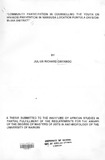| dc.contributor.author | Onyango, Julius R. | |
| dc.date.accessioned | 2013-05-09T13:38:52Z | |
| dc.date.available | 2013-05-09T13:38:52Z | |
| dc.date.issued | 1994 | |
| dc.identifier.citation | Masters of Arts Degree in Anthropology | en |
| dc.identifier.uri | http://erepository.uonbi.ac.ke:8080/xmlui/handle/123456789/20925 | |
| dc.description | Thesis submitted to the Institute of African studies in
partial fulfillment of the requirements for the award
of the Degree of Masters of Arts in Anthropology of the
University of Nairobi | en |
| dc.description.abstract | The broad objective of the study was to investigate the role of community based
institutions in counseling the youth about HIV/AIDS prevention. Specifically, the study
focused on identification and description of community institutions, their knowledge on
HIV/AIDS prevention, constraints they encounter when counseling the youth and the
strategies they attempt to put in place to remove the barriers. In addition, an attempt
was made to describe the perceptions that the youth have about the information that is
provided by the community based institutions.
A random sample size of 150 youths from a sample frame of 15-29 years old provided
data through a semi-structured questionnaire. Additional data were collected through indepth
interviews with key informants and focus group discussions with he youth from the
Anglican and Catholic Church. A person was the unit of analysis. Cultural Ecology was
used as the theoretical framework to guide the study. The study was based on the
assumptions that community based institutions are not sufficient for counseling the
youth, social and economic constraints inhibit information on counseling and the
perceptions that the youth have about the information provided during counseling
contribute to behaviour change.
Study results suggest that there are community institutions but very few of them attempt
to articulate issues that pertain to HIV/AIDS. Those that articulate HIV/AIDS related
issues address the population as a whole but not the youth as a specific group. The
youth get advice via the general community gatherings like in the church, during funerals
and he community "barazas". Institutional efforts are constrained by factors like lack of
funds, culture, frequent migration by the youth seeking for the means of livelihood and
the inaccessibility to some areas of the location due to lack of adequate means of
transport and poor infrastructure.
Based on the findings, the following recommendations were drawn:
1. There is need of concerted efforts by all stakeholders to set up convenient youth
gathering venues for counseling.
2. The community based institutions should collaborate with the government and well
wishers to establish a fund to enhance mobility in the area.
3. The content of the study literature should be practically relevant to the needs of the
youth's sexuality.
4. The people who deliberately infect others need sustainable counseling in order to go
for voluntary testing and demystify the disease.
5. The government should introduce compulsory free universal primary education to
reduce levels of illiteracy.
6. Video halls and local funeral discos should either be controlled or abolished. | en |
| dc.language.iso | en | en |
| dc.publisher | University of Nairobi | en |
| dc.title | Community participation in counseling the youth on Hiv/aids prevention in Nanguba location Funyula division: Busia district | en |
| dc.type | Thesis | en |
| local.publisher | Department of Arts In Anthropology | en |

